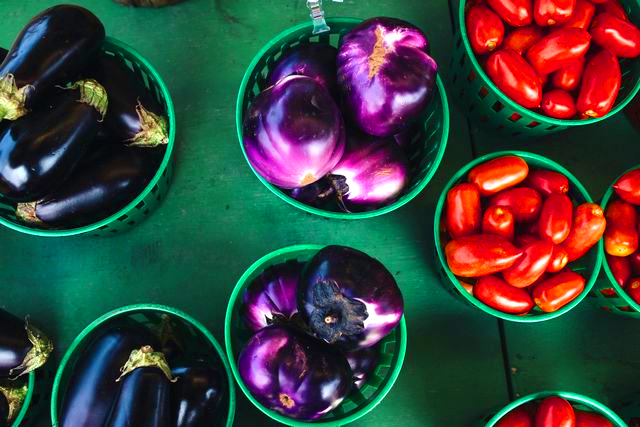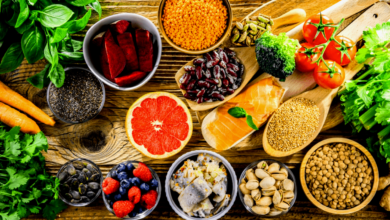Can Nightshade Vegetables Reduce Arthritis Pain?

Plants in the Solanaceae family include nightshade vegetables. Most nightshade plants, like tobacco and belladonna, are poisonous.
Only a few nightshade vegetables are edible. They are common diet mainstays like:
- tomatoes
- eggplant
- potatoes
- peppers
There are substances known as alkaloids that are found in every nightshade plant. In excessive doses or when present in a green potato, the alkaloid known as solanine, which is found in nightshade crops, has the potential to be lethal.
But there is no evidence that solanine is hazardous when consumed in amounts that are usual for food. Additionally, solanine is not only present in nightshades; it can also be found in blueberries and artichokes and other foods.
Anecdotal evidence that nightshade vegetables are known to cause inflammation in the body has contributed to the negative reputation that these veggies have received.
However, the elimination of nightshades from one’s diet may not necessarily result in pain relief for all individuals who suffer from painful joints. In addition, there is evidence to suggest that the nutritional value of nightshades may be beneficial in alleviating the symptoms of arthritis.
Read More : How Are Heart Diseases Diagnosed?
Further reading will provide you with information regarding the potential health advantages of certain veggies, as well as how they may effect inflammation in the body.
What the research says about nightshade vegetables and arthritis
The Arthritis Foundation asserts that the notion that consuming vegetables that are classified as nightshades can make arthritis symptoms worse is a fallacy. As a matter of fact, the high nutritional value of nightshades may be beneficial to individuals who suffer from arthritis.
For instance, researchers in a study that was conducted in 2011 discovered that healthy men who consumed yellow or purple potatoes, which are classified as nightshade vegetables, for a period of six weeks experienced a reduction in inflammation and DNA damage.
On the other hand, a study that was conducted in 2020 and referred to as a Trusted Source demonstrated that the solanine found in nightshade vegetables has the potential to undermine the barrier that protects the gut, resulting in intestinal permeability or leaky gut.
Yet, there is a need for additional investigation. At this point in time, there is not a lot of scientific evidence to support either side of the argument.
Health benefits of popular nightshades
A significant number of nutrients can be found in the majority of nightshade plants. In addition to this, they are easily accessible and simple to prepare. For individuals who do not suffer from an inflammatory condition such as rheumatoid arthritis (RA), the benefits of consuming nightshade vegetables may, in certain circumstances, exceed any potential risk of inflammation.
1. Peppers
The amount of fat and calories that peppers, such as bell peppers and chili peppers, contain is quite modest.
They’re a good sourceTrusted Source of nutrients such as:
- vitamin C
- fiber
- B vitamins
According to study conducted in 2016, the capsaicin found in chili peppers has the potential to alleviate the pain associated with arthritis by lowering the levels of substance P, a specific pain transmitter found in the nerves.
A great number of pain-relieving lotions contain capsaicin as one of its ingredients. When used topically, it has the potential to create a skin response or a slight burning sensation.
2. Potatoes
It is common for the white potato to have a negative reputation due to the fact that it is a starchy carbohydrate; yet, all forms of potatoes are filled with nutrients. If they are consumed in moderation and are not fried or covered in butter and sour cream, they can be a component of a diet that is more beneficial to one’s health.
There is no fat in potatoes, and they are an excellent source of fiber. Because fiber helps you feel satiated for longer, it can help you eat less overall. Potatoes, which are rich in salt and potassium, contribute to the maintenance of a healthy balance of electrolytes in the body.
They’re also a good sourceTrusted Source of:
- vitamin C
- vitamin B6
- niacin
- manganese
- iron
- copper
- folate
An oven-baked potato is the healthiest type of potato. As a nutritious topping, be sure to include some herbs and a dollop of Greek yogurt. You shouldn’t be afraid to experiment with different kinds of potatoes, especially considering that colored potatoes might provide you with the most anti-inflammatory benefits for your money.
3. Tomatoes
Tomatoes contain all four of the carotenoid antioxidants, which include:
- lycopene
- beta-carotene
- alpha-carotene
- lutein
Lycopene is, without a doubt, the most potent carotenoid. Individuals believe that it can aid in the prevention of certain types of cancer, as well as heart disease and the enhancement of immunity. According to the findings of a study conducted by 2022Trusted Source, tomatoes may possess anti-inflammatory properties; however, additional research is required to confirm this hypothesis.
Tomatoes are a good sourceTrusted Source of:
- vitamin E
- vitamin A
- potassium
- calcium
- vitamin K
- vitamin B
Incorporate fresh tomatoes that have been diced into a green salad, or make fresh tomato juice! Additionally, tomatoes are a delectable addition to chili and veggie soup.
4. Eggplant
Similar to tomatoes, eggplant is classified as a fruit. No cholesterol or fat can be found in it. There is no one vitamin or mineral that is particularly abundant in eggplant; nevertheless, it does contain trace levels of the majority of the necessary vitamins and minerals.
At least one study from 2015 suggests that extract from eggplant stalks may be able to help reduce inflammation. To discover whether or if the eggplant fruit possesses the same capabilities, additional research is required. Bear in mind that the solanine content of eggplant may be detrimental to people who suffer from rheumatoid arthritis.
Try something other than eggplant Parmesan, which is loaded with calories and fat, if you want to incorporate eggplant into your diet. As an alternative, you may try roasting or grilling sliced eggplant after first coating it with olive oil and several different herbs. Alternatively, you can steam eggplant or add slices that have been sautéed to your preferred vegetable pizza.
Should you remove nightshades from your diet?
The elimination of nightshades from one’s diet or the restriction of their use may reduce the likelihood of difficulties resulting from leaky gut syndrome or other gastrointestinal issues for individuals who are living with rheumatoid arthritis (RA).
If you want to know for sure how nightshades affect you, you should test it out on an exclusion diet. Let’s see whether your symptoms improve if you abstain from consuming any nightshades for a period of two weeks. Try reintroducing them into your diet and observing whether or not your symptoms become more severe if you are unsure.
Stop eating immediately and make an appointment with your physician if you develop any of the following symptoms after consuming any food:
- tingling mouth
- rash or hives
- itching
- swelling of the face, tongue, or throat
- difficulty breathing or wheezing
- gastrointestinal distress
- struggling to breathe
- sudden feeling of weakness
- dizziness or lightheadedness
- fainting
The symptoms of food intolerances are distinct from those of food allergies in that they do not necessarily present a risk of anaphylaxis. Despite this, it is still possible for an individual to experience unpleasant symptoms such as pain, discomfort, aches, and gastrointestinal problems.
Your dietician can assist you in adhering to an elimination diet in order to detect and treat any allergies or intolerances that you may have.
Anti-inflammatory foods to try
It has been hypothesized that a variety of foods can assist reduce inflammation in the body. They may help minimize joint discomfort and swelling if they are consumed on a regular basis. Some of the most well-known foods that reduce inflammation are:
1. Omega-3 fatty acids
As a result of reducing two proteins that are responsible for inflammation, foods that are high in omega-3 fatty acids may be able to help fight inflammation. Omega-3 fatty acids may also help lower cholesterol levels and lessen the chance of developing cardiovascular disease.
Common options include:
- salmon
- sardines
- mackerel
- flaxseed oil
- chia seeds
- walnuts
- soybeans
- spinach
2. Produce
Antioxidants can be found in abundance in fresh food, including berries, leafy greens, and other items. You can strengthen your immune system and possibly lower your risk of inflammation by eating a diet that is abundant in antioxidants. One of the most beneficial things you can do for your general health is to guarantee that you consume a wide range of fruits and vegetables.
This may help:
- prevent weight gain
- reduce your risk of heart attack and stroke
- lower blood pressure
- reduce your risk of some cancers
- reduce your risk of bone loss
3. High fiber foods
The Arthritis Foundation suggests that foods that are high in fiber, such as nuts, whole grains, and fruit, may be able to assist in the response to inflammation markers that are typical of arthritis. They accomplish this in a few different ways:
- It is beneficial in reducing the levels of C-reactive protein in the blood. A number of inflammatory illnesses, including rheumatoid arthritis, have been associated with C-reactive protein throughout time.
- The accumulation of fat, which is another element that is associated to inflammation, may be prevented by fiber.
4. Olive oil
One of the most important components of the anti-inflammatory Mediterranean diet is olive oil. One of the studies that was conducted in 2011 found that olive oil has a number of chemicals that have the ability to reduce inflammation. It has been demonstrated that oleocanthal, a phenolic chemical, possesses anti-inflammatory properties that are comparable to those of ibuprofen.
5. Onions
Quercetin is a type of bioflavonoid that can be found in onions. In a study that was conducted in 2016, it was shown that quercetin possesses both anti-inflammatory and antioxidant properties. By inhibiting the release of histamine and mast cell production, it has the potential to assist in the prevention of allergic interactions. On the other hand, this study is somewhat old, and there is a need for more recent research.
Read More : 7 Best Reasons to Eat Pistachios This Winter Season
Other foods that contain quercetin are:
- apples
- leafy green vegetables
- beans
- grapefruit
Limit or avoid foods proven to be inflammatory
Not only is it essential to incorporate foods that contain anti-inflammatory properties into your diet, but you should also steer clear of items that increase inflammation.
There is a correlation between foods that are heavy in saturated fat and trans fats and inflammation in the body. These include, among other things:
- fried foods
- potato chips, crackers, and other processed snack foods
- processed baked goods, such as cakes and cookies
- foods cooked at high temperatures
- foods high in sugar
- beverages high in sugar, such as soda and sweetened fruit juice
- foods high in sodium
There is a possibility that certain dairy products could promote inflammation in some individuals, particularly those who are allergic to cow’s milk. On the other hand, yogurt and other dairy products are related with a reduction in inflammation.There is a reliable source.










